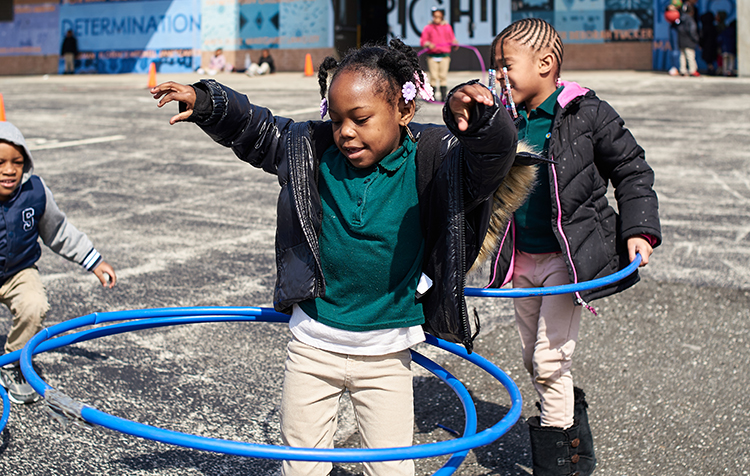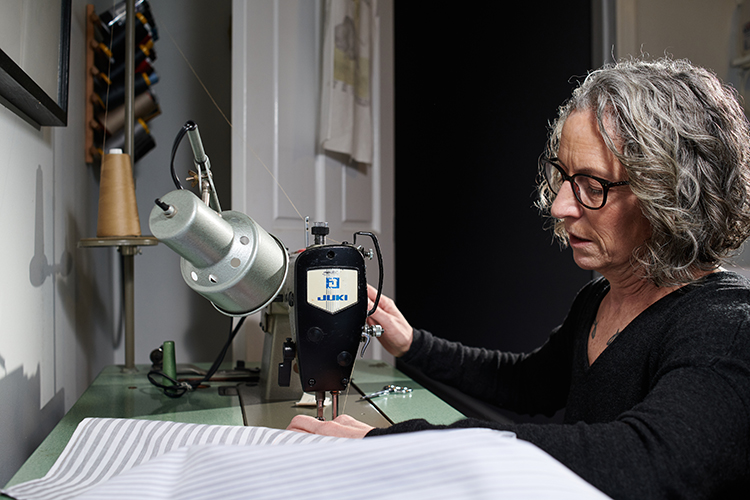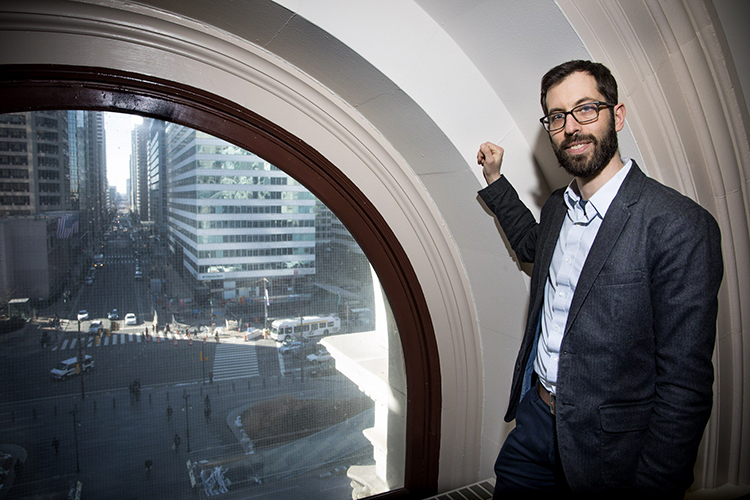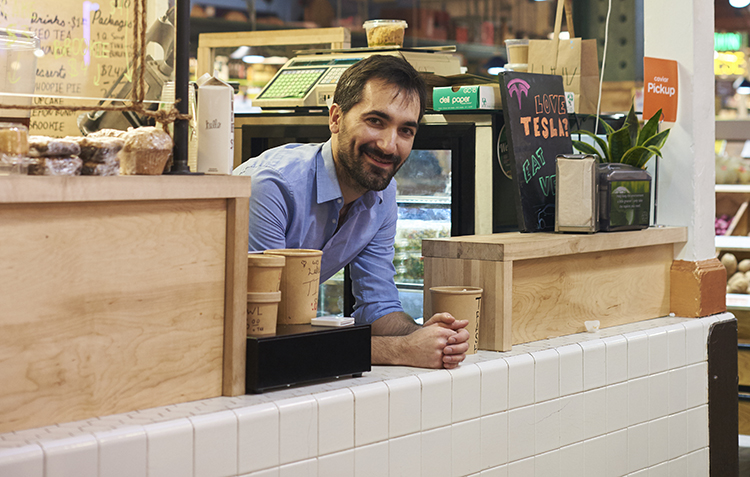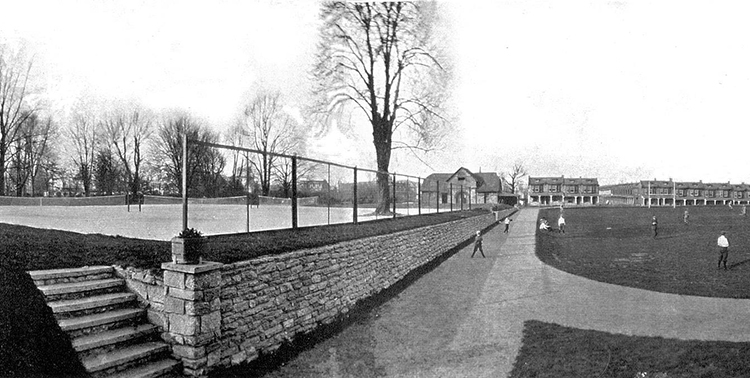Photo: Albert Yee
by Claire Marie Porter
On half a city block of pavement in the Strawberry Mansion neighborhood, the kindergarteners of Richard Wright Elementary school play. One group hula-hoops, another plays kickball, while another waits in line to scooter-board from cone to cone. The playground is peaceful, there is nothing remarkable—which is perhaps what’s most remarkable.
For years U.S. school systems have viewed play and learning as opposing forces in a school day, and the emphasis on standardized testing has led to an overall decrease of playtime in schools over the last two decades. A 2006 survey from the Center on Education Policy at George Washington University reported that 20 percent of school districts across the country had cut recess time, and in a 2016 Shape of the Nation report, only 16 percent of states require daily recess for elementary students.
Americans like to compartmentalize. There is work time, gym time, family time, television time. The idea of work being playful, or weaving physical exertion into everyday activities, is foreign.
And yet, research has shown that learning through play and playing through learning produces the best academic results.
Children who play, and play well, are more empathetic, better leaders and more successful in the workplace and adult relationships. Integrative play is powerful.
Playworks
Playworks, founded in Oakland, California, in 1996, is a nonprofit that partners with low-income schools to provide resources for better play. With 22 regional offices across the country, the program uses diagnostic tools and direct support to evaluate the quality of each school’s play, designing their curricula to meet each individual school needs. And it’s getting results.
Playworks opened a regional Pennsylvania office in 2011 (Playworks Pennsylvania) and has since partnered with 20 schools in the Philadelphia School District to help them improve recess and playtime activities. Each partner school is assigned a coach who works in the school year round to mobilize and coordinate positive play and exercise throughout the day and after school. This system has led to a decrease in bullying and an increase in learning and productivity.
“Our work is all about changing school climate, and making sure kids have the opportunity for safe, fun and inclusive play,” says Ivy Olesh, the executive director of Playworks Pennsylvania.
Olesh has seen the benefits of Playworks from various perspectives. Before becoming the executive director, she watched the work of the program in her local school, Chester A. Arthur. When her own child started kindergarten, she was able to see the impact on her child, and now, as a director, she witnesses its success at a systemic level throughout the city.
Through onsite consultation and professional development training, they help schools to develop the skills and tools they need to meet their goals. The focus is on public and charter schools that qualify for Title 1, that receive supplemental funds for high concentrations of low-income students.
Playworks’ biggest challenge is the demand from schools and principals who want to implement the program, says Olesh.
“Our inboxes and phones can ring off the hook,” she says.
That demand is encouraging though, she adds.
“We’ve been thrilled to see the school and district believe in the power of play and understand the consequences when play and recess aren’t properly programed,” she says.
How it works
Playworks doesn’t have the resources to be on every Philly school site all year round, but every public school has “climate staff,” people who are tasked with overseeing lunch and recess. They are hired by the school district, so each might approach these breaks with a different mindset.
“Inconsistency in approach leads to inconsistency in recess,” says Olesh, so Playworks is working on implementing a pilot program to train climate staff at a district level before school starts. They’ve partnered with 150 elementary schools, equipping them with positive-play models.
“The goal is that we meet the training needs so we can learn to train climate staff in every school and increase equity across the district.” The idea being that even if they don’t have an active Playworks staff person, there is a set baseline for quality play, says Olesh.
“We’re feeling really encouraged by Philadelphia,” says Olesh, that schools are beginning to place emphasis on play and seeing play as beneficial for the child.
“This is really exciting.”
Conscious positivity
Not all play is good play. If it’s dangerous, exclusionary or kids are bored, those behaviors will be directly reflected in the classroom.
“Recess can be the best or the worst time for kids, ” says Olesh. Time and space alone to play aren’t enough, she says, and it’s critical that that time is positive.
“What we need to ensure is structure, so you’re not seeing exclusion or bullying,” says Olesh.
When play is going well, children have the freedom to learn to collaborate, to develop conflict-resolution skills. But if there are unresolved disciplinary issues, those can have negative long-term consequences, she says.
What Playworks tries to do is help to equip school with a system to overcome those challenges and ensure that kids have the opportunity to play together. And that manifests differently in different schools.
“We love games—we are big believers in allowing kids to approach play in a way that makes sense for them,” she says.
Some kids will already be inclined toward creativity, they’ll develop their own games. But some children do better with structured games, like tag, or a ball game, says Olesh.
“What we try to do is to ensure that there’s intentionality behind the games.”
Playworks will evaluate those games to make sure there are learning skills embedded in them: communication, teamwork, leadership. While physical activity is a priority, so are these other skills.
“Students should come back to class ready to learn,” says Olesh, because they got their energy out, but also because they spent time problem solving and practicing inclusive play. If they’ve been harboring feelings throughout the school day, recess is a time when they can work through those feelings, she says.
Junior coach, Nafis Johnson, 11, has been helping to implement Playworks principles at Chester A. Arthur since fourth grade.
“I usually run games, stop bullying and fights, and work with kids to help them play games and handle equipment,” he says.
When he was in first and second grades, he was influenced and inspired by a friend who was a junior coach at his school, so he decided to get involved
with Playworks the earliest he could. He helps out with different shifts, sometimes kindergarteners, sometimes fifth graders and sometimes seventh graders.
As a junior coach, one of his jobs is to analyze the recess times of different classes to see how they’re doing, he says. Then they take each individual grade outside to participate in a “classroom game,” tailored to fit the life skill the classroom is currently working on. “Blind ball,” is an example, wherein a person is blindfolded and they have to get to a ball following the verbal instructions of classmates.
“It helps with coordination and teamwork,” says Johnson.
Johnson says he also uses positive reinforcement, and if there’s a conflict in the classroom or playground, he’ll use Playworks version of “rock, paper, scissors.”
“Ro Sham Bo, let it go!,” he says, still using the traditional symbols.
The junior coaches model positive and inclusive behavior and empower other students to become leaders and reflect those behaviors.
All you need is space
A good play environment doesn’t necessarily mean a state-of-the-art playground. In fact, they don’t even need a playground.
That’s good news for Philadelphia because according to a recent report, two-thirds of the city’s schools don’t have an official play yard.
“There are so many schools that don’t have access to a playground, but it doesn’t mean they can’t play,” says Olesh. “Building a playground is a huge expense, so we want to meet [the schools] where they are.”
Negative behavior at recess doesn’t change when a child transitions from an asphalt lot to a nice playground, says Olesh.
“If kids are outside playing and they are fighting or pushing, people think it’s because they don’t have a nice playground … that’s not true,” she says.
“We are much more about the programming of play than we are about the space in which it occurs,” says Olesh. “Play can happen and should happen anywhere.”
Wright Elementary in action
In a diverse city like Philadelphia, kids have different access to play. In many communities, it’s not always safe to play outside.
“Not all children know how to play,” says principal of Richard Wright Elementary school, Jeannine Payne. “I’m talking about understanding rules, boundaries. When you allow children to just go out and play with no structure, they’re going to do what they know … they’re going to engage in things they do at home or in their neighborhood,” and that’s different for each child, she adds.
When Payne came to Wright Elementary four years ago, she proposed that the school bring in Playworks and increase the ratio of adults to students during lunch and recess.
“No one would question that those are two of the less-structured times of days,” she says.
Before Playworks, she says, a lot of the students would just congregate next to the fence, sitting on the ground, chasing each other around. Now the students are engaged.
Payne says that organized, healthy play makes the transition from the playground to the classroom much smoother.
“We probably gain instructional minutes,” she says. The character of playtime not only gives the kids physical activity and a break from sitting, but the structure of their play means that the teachers don’t need to spend 15 to 20 minutes just mitigating the conflicts that arise with unstructured free time.
Lunchtime at Wright is a great accomplishment, too, says Kahlef Webb, climate manager of four years. “This is nothing like it used to be,” he says, gesturing toward the 60 kindergarteners peacefully sitting and eating. Kids would be throwing food, fighting, running around, getting hurt and needing to go to the nurse’s office. Now they easily transition in and out, he says.
There are various approaches and levels of involvement based on the school’s specific needs. In all cases, the ultimate goal is to get the school functioning on their own with minimal to no support.
Wright Elementary has recently moved from a direct-coach model to a Team Up Model, the next tier of progress in the Playworks approach, which requires only monthly check-ins from Playworks coaches.
Being able to sustain the Team Up Model without direct support has been Wright’s greatest accomplishment with Playworks, says Payne. They are on their way to being self-sustaining.
There’s a certain amount of equity that’s linked to children’s ability to engage with productive play, she says. When schools are marked as under achieving or having academic deficits, often times the proposed strategies feel like punishments.
This year Richard Wright Elementary is no longer considered a “high needs” school, says Payne. Wright was previously listed as a priority school with Title 1 designations, now that designation is gone, and according to Great Philly Schools, it’s a “High Academic Growth” school.
Data-driven play
“One of the things I love about Playworks is that they are an evidence-based program,” says Olesh. “We think a lot about the data and the impact we’re having.”
Playworks conducted a randomized control trial with Stanford University and found that Playworks students were safer, more socially active and there were less bullying behaviors.
Playworks also developed the Great Recess Framework, a recently validated observational tool that helps them to evaluate levels of safety, empowerment and engagement.
With a consistent diagnostic tool, Playworks can enter a school, talk to the principal, their climate staff, observe recess, and then use the tool to try to determine and match that school’s needs.
According to Playworks data, 93 percent of educators report an increase in students’ ability to focus, 98 percent increased physical activity and 94 percent report an increase in ability to resolve conflicts on their own.
Olesh also mentions Recess Lab, an online diagnostic tool that can be used by anyone—school system, educators, parental figure—to assess their child’s play.
It provides tools for mapping a playground and creating zones for different games and simple rules for safe and equal play.
Recess Labs also allows schools to take their own “recess checkup,” an online anonymous quiz for assessing the culture of recess. Questions include, “How often do games break down during recess due to confusion about game rules?” and “Considering your student population, how inclusive are the games being played at recess?”
Most importantly, these diagnostic tools emphasize that these models are not one-size-fits-all. Every school has different needs, and those include their recess needs, says Olesh.
Olesh says the importance of play is very recently at the forefront of school priorities, and educators are recognizing the variety of learning opportunities that play affords.
“Schools are starting to place some serious value in educating the whole child–the kids are constantly encountering opportunities through play to become great readers and learn math,” she says.
Approaching the whole child is essential. It can influence the playground climate, the classroom climate and the home climate.
“Why I believe strongly in the importance of our work,” says Olesh, “is because, at the end of the day, we are talking about a continuum of development.”

